This is the sixth installment in our series breaking down the major trades of the 2022 offseason. As opposed to giving out grades, this series will explore why the teams were motivated to make the moves. Let’s dive into a deal that saw an All-Star head from the Spurs to the Hawks…
The day before free agency opened, the Spurs agreed to send Dejounte Murray and Jock Landale (later dealt to the Suns for cash considerations) to the Hawks in exchange for the Hornets’ 2023 first-round pick (top-16 protected), the Hawks’ 2025 first-round pick (unprotected), the Hawks’ 2027 first-round pick (unprotected), the right to swap first-round picks with the Hawks in 2026, and Danilo Gallinari.
The Spurs’ perspective:
Why would the Spurs part with a first-time All-Star who was runner-up for the Most Improved Player Award?
After making the playoffs for an NBA-record 22 consecutive years from 1998-2019, winning five championships in the process, the Spurs have been stuck in mediocrity for the past three seasons, finishing with records of 32-39 in 2019/20 and 33-39 in ‘20/21.
Last season, with Murray as the team’s best player, the Spurs finished with a 34-48 record and the 10th seed in the West — below average, but not bad enough to have a real puncher’s chance at the top pick. The team went just 4-10 in games Murray missed.
Sometimes bottoming out is the best way to improve a franchise in the long run, as unpalatable as it might be for owners, front offices, coaches, players and fans alike. The 2023 draft class features French phenom Victor Wembanyama, a player whom some talent evaluators consider the best prospect the NBA has seen since LeBron James turned pro in 2003. You can connect the dots.
Murray was a developmental success story for the Spurs. He gradually transformed from a raw prospect, selected 29th overall in the 2016 draft, into an All-Star.
The Spurs received a substantial return for him. Unprotected first-round picks are one of the most valuable commodities in the NBA, and San Antonio gained two of them with the possibility of a third if the Spurs are better than the Hawks in 2025/26.
San Antonio also gained another first-rounder with a reasonable chance of conveying at some point in the next three years – the Hornets’ 2023 pick will be lottery-protected in 2024 and 2025 if it doesn’t convey next year, then would turn into two second-round picks if it hasn’t conveyed by that point.
Gallinari, who received a partial guarantee of $13MM on his $21MM+ expiring contract, was only included in the deal for salary-matching purposes and has already been waived and subsequently signed with Boston as a free agent.
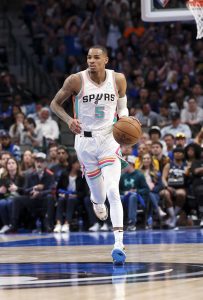 For San Antonio, the move was less about a lack of faith in Murray’s abilities and more about having a chance at the top pick in 2023 and extracting maximum value for a player coming off a career season. In ‘21/22, he averaged 21.1 PPG, 8.3 RPG and 9.2 APG on .462/.327/.794 shooting in 68 games (34.8 MPG).
For San Antonio, the move was less about a lack of faith in Murray’s abilities and more about having a chance at the top pick in 2023 and extracting maximum value for a player coming off a career season. In ‘21/22, he averaged 21.1 PPG, 8.3 RPG and 9.2 APG on .462/.327/.794 shooting in 68 games (34.8 MPG).
Keep in mind that Murray enters free agency in 2024, the season before the first unprotected pick from Atlanta conveys to San Antonio. Considering Murray just had the best season of his six-year career, it’s possible he could continue to get better, but if the Spurs waited until next summer, he’d be on an expiring contract and would likely be seeking a maximum-salary deal in free agency, diminishing his trade value. If things don’t work out between Murray and the Hawks, or they simply don’t want to pay him a max deal in two years, the Spurs are the clear beneficiary.
Are the Hawks appreciably better by making the trade entering ‘22/23? Yes. Can Murray push them over the top in an increasingly competitive East? I’m a little skeptical.
The Celtics, Heat, Bucks, Sixers, Raptors, Bulls, Nets and Cavaliers all finished with better records than the Hawks (43-39) last season, and the Hornets had the same record before getting blown out by Atlanta in the play-in tournament (the Hawks advanced as the eighth seed after beating Cleveland in the second play-in game).
So maybe, optimistically, the Hawks finish as a top-four or top-five seed in the East. They still have to get past the Bucks, Sixers, Celtics and Heat, who eliminated Atlanta in a five-game first-round series last season. There are roadblocks.
The Nets have a formidable roster if it remains intact. The Raptors will be better with another year of experience. The Bulls and Cavaliers could be too.
There’s a reason the Spurs pushed for the unprotected picks to be years down the line, when the Hawks are much less certain to be a perennial playoff team. Even if those selections are “just” lottery picks and not highly-coveted top-five picks, they would still have considerable value. They’d have even more trade value leading up to those drafts if Atlanta doesn’t look like a good team in the future.
It’s worth noting that Murray and Atlanta’s star point guard, Trae Young, were both very ball-dominant players last season, and Young hasn’t shown much inclination to play an off-ball role. Young has been extremely effective as an offensive engine, with the Hawks ranking eighth and second in offensive rating during the last two seasons.
If Young remains the primary ball-handler, that could reduce Murray’s effectiveness. His breakout season came in the aftermath of DeMar DeRozan, San Antonio’s previous leading scorer and primary play-maker, heading to Chicago in a sign-and-trade last summer.
For as stellar as he was last season, and make no mistake, he was very good, Murray’s 53.3% true shooting percentage was below league average, his career true shooting percentage (51.5%) is even worse, and he holds just a 33% mark from beyond the arc. His career percentage on corner threes is 32.3%, including just 28% last season.
None of those percentages scream “I can spot-up when I have to and make shots consistently.”
Atlanta’s roster could also get very expensive in the future, depending on how much money the team invests to keep the players it has drafted in recent years. De’Andre Hunter is eligible for a rookie scale extension that would kick in starting in ‘23/24, and Onyeka Okongwu will be eligible for an extension next summer that would begin the following year.
Those extensions would be in addition to the major contracts already on the books for Young, John Collins and Clint Capela, all of whom are under contract through at least ‘24/25. If Murray re-signs with the Hawks on a max deal as a free agent, those four players alone could cost $140+MM, depending on how much the cap goes up. The Spurs are betting the Hawks will be hesitant to pay such a hefty price tag if they don’t find more postseason success in the next couple years.
The Hawks’ perspective:
How many times do you have an opportunity to trade for an All-Star who is just entering his prime? Not only that, but Murray, who turns 26 years old in September, has team-friendly salaries of $16.57MM in ‘22/23 and $17.71MM in ‘23/24.
Atlanta didn’t give up any win-now pieces from next season’s team. Prior to the trade, Gallinari’s partial guarantee was only $5MM, so there was no chance the Hawks were going to guarantee the remainder of that sizable deal, given the forward’s declining play and advancing age. Moving off that contract was a bonus.
It was clear the Hawks needed to make moves after an uneven regular season and a disappointing playoff exit which saw the Heat stymie Young, forcing him into more turnovers per game (6.2) than assists (6.0) and drastically reducing his scoring (15.4 PPG on .319/.184/.788 shooting vs. 28.4 PPG on .460/.382/.904 shooting in the regular season).
To aid their star, the Hawks acquired Murray, a player who has consistently improved various aspects of his game every season. General manager Landry Fields recently said they’re betting on the “character makeup” of the two All-Stars and their will to win together.
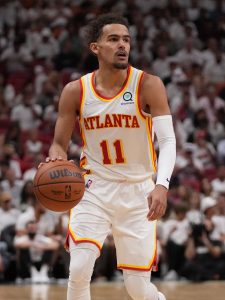 I’m very curious to see how Young and Murray complement each other on offense, since it will take significant adjustments from both players to get the best out of each other’s talents.
I’m very curious to see how Young and Murray complement each other on offense, since it will take significant adjustments from both players to get the best out of each other’s talents.
If Young can become much more active away from the ball – coming off screens, setting back-screens, drawing attention away from teammates — that would allow Murray to handle the ball more, and he had a lot of success as a lead ball-handler last season, ranking fourth in the league in assists (9.2), one spot below Young (9.7). Murray also posted a much better assist-to-turnover ratio than his new teammate (3.48-to-1 vs. 2.43-to-1).
I suspect that head coach Nate McMillan will experiment with staggering their minutes somewhat to give Murray more opportunities to run the show with the second unit.
Murray is a pretty significant defensive upgrade over Kevin Huerter, who was dealt to Sacramento in a trade that we’ll cover next week. Murray led the league in deflections (4.0) and steals (2.0) per game last season and is an effective point-of-attack defender.
Having said that, I do think his All-Defensive nod back in ’17/18, prior to his torn ACL, has given him a reputation that has exceeded his actual play on that end of the court the past few seasons. For example, the Spurs’ defensive rating was better when he didn’t play last season (113.4 on vs. 111.9 off), but he was still an overall net positive (+2.3) because they were much better offensively when he was on the court (114.4 on vs. 110.6 off).
Young, of course, is one of the league’s worst defenders, so it’s not as though placing him on a shooting guard instead of having him up top makes things any easier for the Hawks. They will likely still try to hide him on the opposing team’s worst offensive player.
Murray has been an excellent rebounder throughout his career, and he pulled down a career-high 8.3 boards per game last season. Atlanta ranked just 20th in the league in rebounding last season, so that’s another area in which he will definitely help the team.
The Hawks are also betting on a return to health for three players who were all hampered with various injuries last season: Collins (foot/finger), Capela (Achilles soreness/knee) and Bogdan Bogdanovic (knee). All three were key contributors during the team’s surprising run to the Eastern Conference Finals in 2021, but none were healthy in the 2022 postseason.
The Hawks have youth on their side. Of the projected starting lineup of Young, Murray, Hunter, Collins and Capela, the veteran center is the eldest at 28 years old.
Okongwu, who could eventually replace Capela, won’t turn 22 until December. Atlanta’s 2021 first-rounder, Jalen Johnson, turns 21 in December. 2022 First-rounder AJ Griffin won’t turn 19 until August.
The Hawks control their own first-rounders in 2023 and 2024, have an additional lottery-protected pick from the Kings in 2024 (via the Huerter deal), and control five second-rounders over the next two drafts.
The reason I mention the youth and draft equity is because it’s not as though trading for Murray was a death knell for the future. There are still multiple pathways for the Hawks to pivot if things go south, and if they get better, they have some additional assets to continue to improve, if needed.
If Young and Murray form a dynamic backcourt and the roster continues to develop, and if the aforementioned trio return to health and form, Atlanta has the talent to potentially make another deep playoff run, but it won’t be easy.
Even if all those things go right, questions remain. The team’s defense, which ranked 26th last season and hasn’t been better than 21st over the past five years, has to get much better. Young will have to guard someone. Murray will have to make teams pay for leaving him open from behind the arc on offense.
Can Hunter be the player who can defend the big wing scorers like Kevin Durant (if he remains in the East), Jayson Tatum, Jaylen Brown, Jimmy Butler, and Khris Middleton? Who is guarding the likes of Giannis Antetokounmpo and Joel Embiid? For as good as Capela was two years ago, and he was excellent, he could not stop Brook Lopez down low when Antetokounmpo was injured in the Conference Finals, so he is definitely not stopping either of those two superstars. And that’s only in the East.
The Hawks know all that. They know the fit isn’t seamless, and asking their new backcourt to make major adjustments when they’ve already had individual success isn’t ideal. But they’re betting that Young and Murray can make those adjustments and that the team will become a sustainable winner in part due to their efforts.
The Hawks gave themselves a timeline by trading away first-round picks with no protections. If everything clicks, they have a chance to be very good. But the clock is ticking, and the Spurs are waiting.
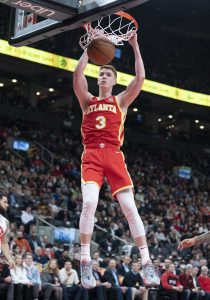 Enter Huerter, who averaged 12.1 PPG, 3.4 RPG and 2.7 APG in 74 games in 2021/22 (60 starts, 29.6 MPG). A look into his shooting numbers reveals that Huerter was an above-average marksman from all over the court, with a 57% true shooting percentage (58th percentile), 62% at the rim (57th percentile), 48% from mid-range (88%), 38.9% from three-point range (82nd percentile), and 80.8% from the line (64th percentile), per
Enter Huerter, who averaged 12.1 PPG, 3.4 RPG and 2.7 APG in 74 games in 2021/22 (60 starts, 29.6 MPG). A look into his shooting numbers reveals that Huerter was an above-average marksman from all over the court, with a 57% true shooting percentage (58th percentile), 62% at the rim (57th percentile), 48% from mid-range (88%), 38.9% from three-point range (82nd percentile), and 80.8% from the line (64th percentile), per 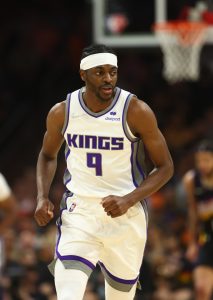 Of the two newly-acquired veterans, I expect Holiday to provide more on-court value and receive more playing time – he’s a much better outside shooter than Harkless (36.5% career from three on much higher volume vs. 32.0%), and I’m sure the Hawks would like to give 2021 first-rounder
Of the two newly-acquired veterans, I expect Holiday to provide more on-court value and receive more playing time – he’s a much better outside shooter than Harkless (36.5% career from three on much higher volume vs. 32.0%), and I’m sure the Hawks would like to give 2021 first-rounder  For San Antonio, the move was less about a lack of faith in Murray’s abilities and more about having a chance at the top pick in 2023 and extracting maximum value for a player coming off a career season. In ‘21/22, he averaged 21.1 PPG, 8.3 RPG and 9.2 APG on .462/.327/.794 shooting in 68 games (34.8 MPG).
For San Antonio, the move was less about a lack of faith in Murray’s abilities and more about having a chance at the top pick in 2023 and extracting maximum value for a player coming off a career season. In ‘21/22, he averaged 21.1 PPG, 8.3 RPG and 9.2 APG on .462/.327/.794 shooting in 68 games (34.8 MPG). I’m very curious to see how Young and Murray complement each other on offense, since it will take significant adjustments from both players to get the best out of each other’s talents.
I’m very curious to see how Young and Murray complement each other on offense, since it will take significant adjustments from both players to get the best out of each other’s talents.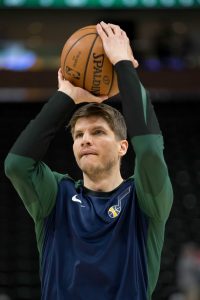 “We are excited to bring Kyle back to the Hawks,” Hawks GM Landry Fields said in a statement. “He is a tremendous person and someone whose presence will benefit all of our players, both on and off the court, drawing from his unique experiences over his 17-year playing career, as a late-second round pick who later became an All-Star in Atlanta and one of the league’s all-time best shooters.”
“We are excited to bring Kyle back to the Hawks,” Hawks GM Landry Fields said in a statement. “He is a tremendous person and someone whose presence will benefit all of our players, both on and off the court, drawing from his unique experiences over his 17-year playing career, as a late-second round pick who later became an All-Star in Atlanta and one of the league’s all-time best shooters.”